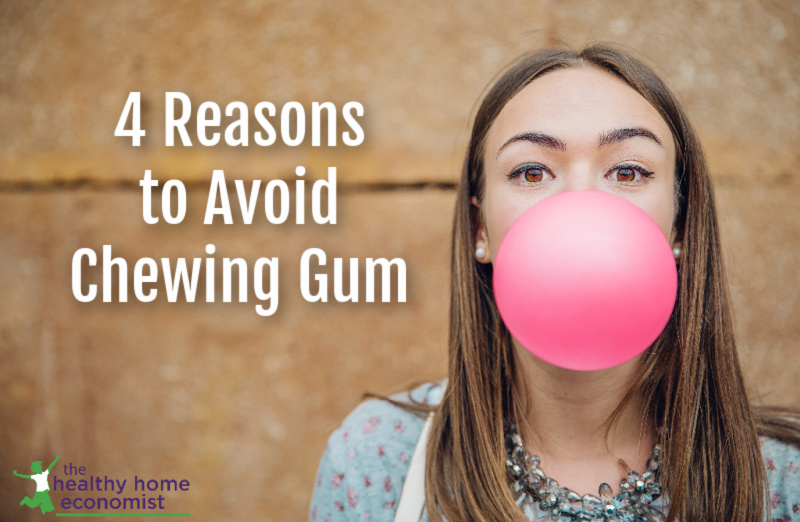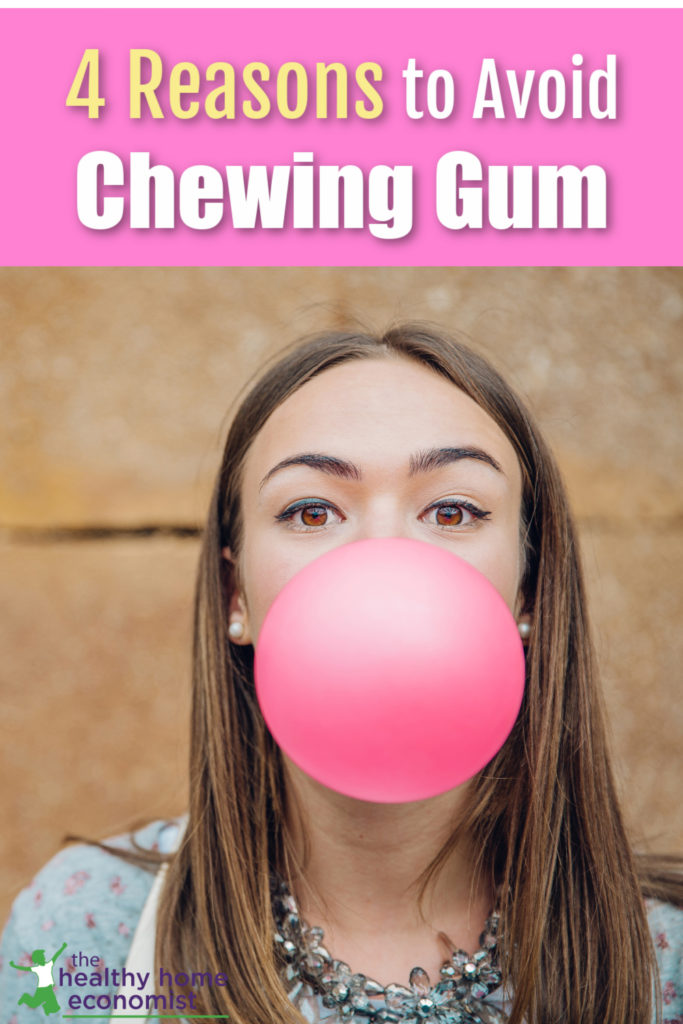The dangers of chewing gum frequently or for more than a few minutes at a time and why it can contribute to the development of digestive disorders and mercury toxicity among other problems. This habit can be particularly problematic during pregnancy.

Chewing gum is a popular activity for people of all ages. I remember becoming quite proficient at blowing very large bubbles at summer camp one year. From then on, chewing bubble gum became a favorite childhood pastime of mine. Besides the bubble blowing, I got pretty good at peeling the gum off my face too!
While chewing gum may be fun and a good way to kill time or stave off boredom, is it a healthy activity? It seems like some folks chew gum every single day. Are there any health issues to be aware of from too much chewing?
Chewing Gum is Full of Chemicals and Artificial Sweeteners
Probably the number one reason to avoid most chewing gums is that they are loaded with chemicals, additives and synthetic ingredients.
GMO corn syrup, artificial colors and flavors, aspartame, sucralose, or other unhealthy sweeteners like xylitol (and the list goes on) are enough to cause any label reading parent to steer clear of these seemingly harmless treats.
It is surprising how some caregivers who would never dream of giving a child a diet soda don’t think twice about doling out sugarless gum with similar potential for neurotoxicity.
Healthfood stores do offer some decent alternatives, but in my experience kids don’t seem much interested in them.
They want the brands their friends chew that come in the the brightly colored packaging and have everlasting synthetic flavors that don’t diminish even after many minutes of chewing.
To keep things simple, I’ve made the habit of simply not buying gum at all. If I really need to chew something on occasion, I keep this healthy gum alternative in the pantry.
My kids do occasionally get a wad of gum at parties and whatnot. We don’t live in a bubble, so this is going to happen occasionally. But, this is an exception rather than the rule. I do try to make sure they don’t chew it for long though!
Uses Up Valuable Digestive Enzymes
It is not well known that the amount of digestive enzymes your body can produce in a given lifetime is relatively finite. Chewing stimulates the secretion of digestive enzymes to prepare for food that never arrives in the stomach.
Doesn’t it seem like a waste to use up your precious digestive enzyme reserve of these valuable, live proteins on such a useless activity?
If you chew gum frequently between meals, it is very feasible that you are using up your digestive enzyme reserves so that the next time you eat, you won’t have enough digestive enzymes on hand to fully digest the meal.
It is conceivable then, that frequent gum chewing gum can provide the perfect backdrop for the development of digestive disorders.
And, if you already suffer from digestive complaints, gum chewing should definitely be avoided!
Contributes to the Development of TMJ and Other Jaw Problems
Oral surgeons at UT Southwestern Medical Center in Dallas contend that too much gum chewing causes jaw stress.
Dr. Sinn, a UT Southwestern oral surgeon, warns that jaw soreness, jaw “clicking” or pain in the jaw, head, or neck can be signs of TMJ syndrome and that gum chewing should be discontinued should such symptoms emerge.
Given that gum chewing is commonly used to relieve stress, Dr. Sinn suggests other methods for reducing tension such as squeezing a ball, relaxation techniques or regular exercise to avoid the risk of chronic jaw problems.
Gum Releases Mercury from Amalgam Fillings
Probably the most important reason to abstain from chewing gum is that it releases mercury from dental amalgam fillings.
A Swedish study found that people with silver fillings who chew gum for 5 hours or more each day had significantly higher levels of mercury in their blood and urine than those people with silver fillings who chewed gum infrequently.
Mercury levels in the blood, urine, and breath at exhalation increased in proportion to the number of silver fillings each study participant had.
Given that mercury is neurotoxic in any amounts in the body, it seems that chewing gum with silver fillings is best avoided. This is the case even if a person has only one silver filling.
Skip the Gum if Pregnant
For pregnant women with silver fillings, chewing gum can prove toxic to the fetus should any mercury whatsoever be released into the bloodstream.
Many pregnant women chew gum to help relieve heartburn or indigestion. Yet, the dangers of this activity if one has dental amalgams are not readily provided at prenatal visits even though mercury easily crosses the placenta.
And no, removing silver fillings while pregnant is not the solution either as it can do more harm than good. Just don’t chew gum during this time!
Can Chewing Gum Ever Be Helpful?
I remember after one particular dental visit years ago, my jaw became painfully sore.
The dentist had obviously overextended the jaw joint and the inflammation and pain was really excruciating for days on end. I tried to not talk much and eat only soft liquid foods to no avail. The joint just didn’t seem to get any better.
Finally, I decided I would try to strengthen my jaw by chewing gum for brief periods of time. This was an attempt to slowly rehabilitate it. An oral form of physical therapy, if you will.
After about a week of chewing gum for short intervals each day, my joint pain began to dissipate. Another week, and it disappeared completely. After that, I stopped chewing gum and the pain still did not return.
Chewing gum might also be helpful after meals when additional enzymes are needed for digestion. Chewing gum for a few minutes after eating does seem to help some folks avoid indigestion, heartburn, or reflux.
In some circumstances such as these, chewing gum can be therapeutic. In most cases, though, it should be avoided as an activity that really is not very health promoting.

References
(1) Chewing Gum Releases Mercury into Blood and Urine
(2) Health Watch – Gum Chewing








My problem with this article is that the concept that digestive enzymes are finite is mildly ridiculous. What enzymes? Lipids, Potassium bicarbonate, Mucin, Pepsinogen, Trypsinogen…the list goes on and on and despite the fact that there are many people who have lived well into their 90’s without a tons of problems digesting their food, it makes me wonder if this is a fact? Where did you get your information? While I understand that gum isn’t great, the amalgam filling warning is very specific but all eating leads to a release of mercury…not just gum. In fact the release of mercury while chewing gum would be minimal compared to that of eating a steak, or a salad and taking your time to chew. Most gum loses it’s flavor after 15 minutes, but most meals last for a half an hour. The only way to change that is to have them removed. I appreciate that you want to help people, and some of your posts are very important but in this case I’m not so sure about your facts.
This is really interesting- The Sticky Truth About Chewing Gum – The Healthy Home Economist http://t.co/0JtGre3
“Glee is made from polyvinyl acetate, just like all the rest.”
Peggy….. where did you get this info from ? I’m interested because when I looked up this company, some time ago, it was/is my understanding that they use chicle from the sapodilla tree. It is what they say they are still using.
I do get it for my kids every now and again, not very often at ALL. Like twice a year. Still I’d like to know.
Thank you.
Glee is a great gum and their website is made from Chicle. It also contains ‘pure cane sugar, rice syrup, natural flavorings and colorings’ and is ‘Vegetarian, Additive Free, Lactose Free, Dairy Free, Wheat Free, Gluten Free, Casein Free, Egg Free, Yeast Free, Nut Free, and Peanut Free.’ Compared to the regular crud in the checkout lane this gum is relatively benign. It looses it’s flavor kind of fast though. *shrug* but I guess when I’ve eaten onions I’m not sure I’ll care.
oops I mean on their website is says it’s made from chicle. Although now that I see that I think it’d be funny to see a website made of chicle.
Another downside that you didn’t mention in your blog is that gum-chewers look like cows!
Even “healthy” gum is usually made from plastic. Even Glee is made from polyvinyl acetate, just like all the rest. We don’t know what’s in the plastic portion – could be BPA, or other “platicizers” or worse, gum manufacturers aren’t sharing that info so we really can’t make an informed choice. Plastic is a petroleum product, so if you are concerned about the price of gas, peak oil or the polluting of the oceans with plastic, there are three good reasons to skip gum. Here’s the source for my comments: http://myplasticfreelife.com/2010/01/chewing-on-plastic-yum/
Glee is a great gum. It contains ‘pure cane sugar, rice syrup, natural flavorings and colorings’ and is ‘Vegetarian, Additive Free, Lactose Free, Dairy Free, Wheat Free, Gluten Free, Casein Free, Egg Free, Yeast Free, Nut Free, and Peanut Free.’ Compared to the regular crud in the checkout lane this gum is relatively benign.
Fascinating post! I was not aware of many of the reasons NOT to chew gum. Will have to share this one with my clients. I don’t chew it often but am going to take it out entirely now.
We buy Glee too and while our kids are fairly small yet, they like it. We used to buy Spry but my son was diagnosed with soy allergies and there is soy lecithin in it…so for anyone avoiding soy…not an option. Not sure if it’s non-GMO soy. But i didn’t know that about mercury fillings, thank you for the info!!!
The Sticky Truth About Chewing Gum – The Healthy Home Economist
http://ow.ly/5ER1B
A funny note – don’t know how healthy it was but my father in law, who was a country boy, used to tell us about how he chewed the sap from the sweetgum tree like chewing gum. I later read that the sap is mildly narcotic. So this sweet conservative man who had to be directed by his physician before he would drink a sip of wine even for his health (a benefit his doctor believed in due to the grapes), was consuming a drug without his knowing it. We never told him!
Yes, Emily, exactly. I wouldn’t want to use gum with harmful ingredients, and for all I know, there aren’t any good ones without them (that I would enjoy).